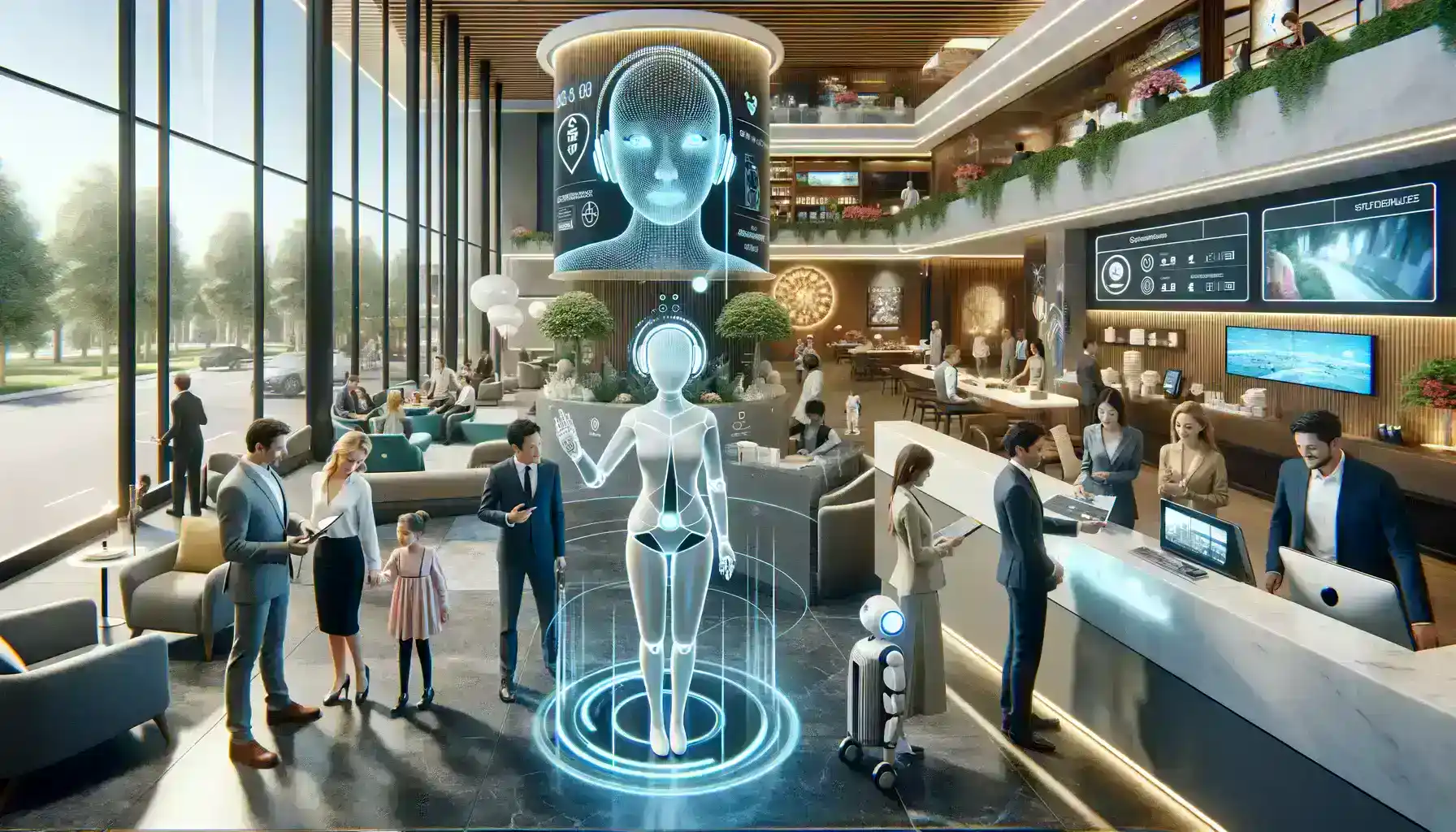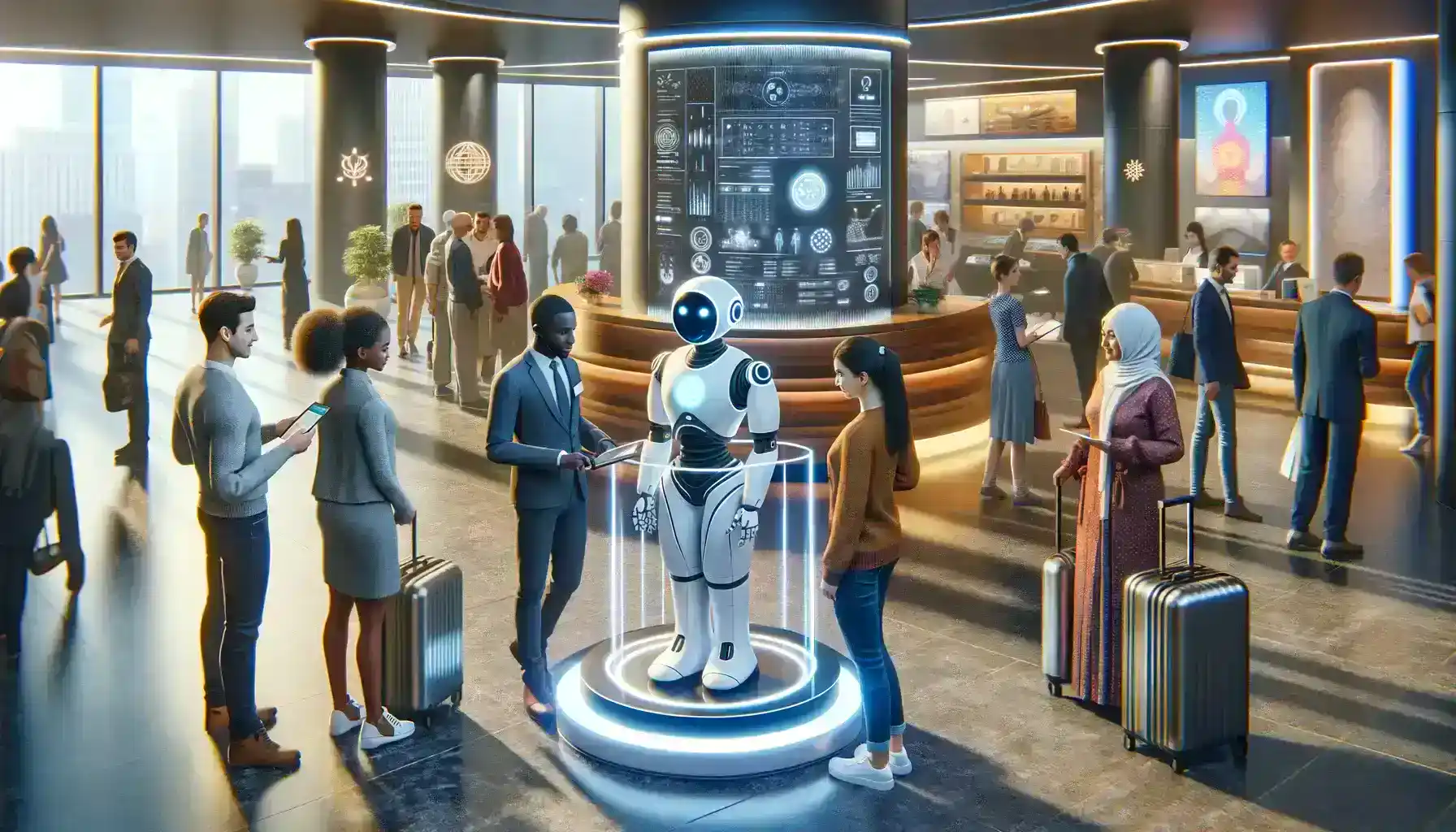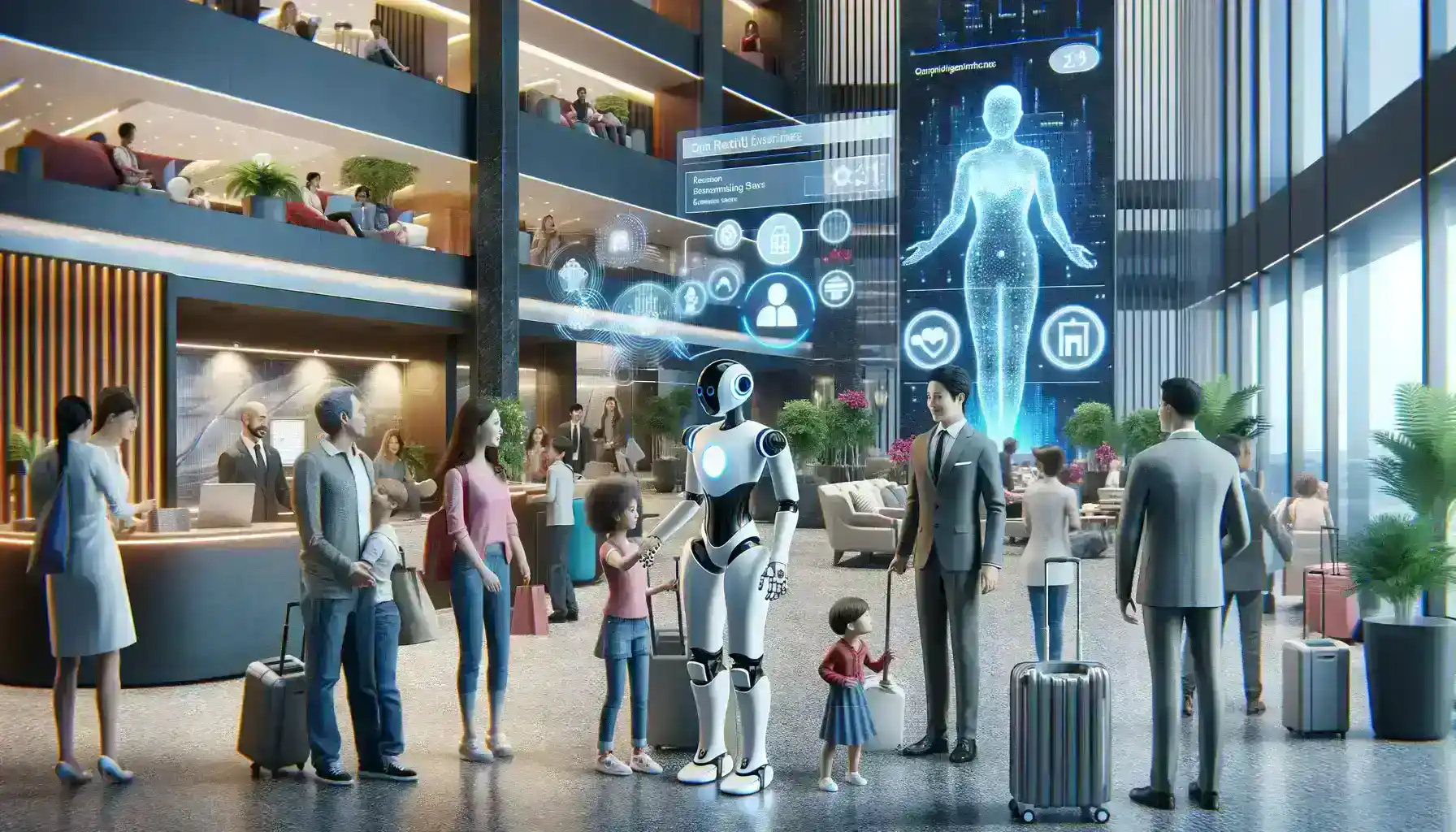Table of Contents
The hospitality industry, characterized by its ever-changing consumer preferences, continual technological advancements, and the increasing demand for personalized guest experiences, is currently undergoing a significant transformation.
In recent years, the integration of artificial intelligence (AI), particularly Generation AI (GenAI), has emerged as a potent driving force reshaping the landscape of the hospitality sector. GenAI, with its unprecedented capacity to understand, interact, and adapt, is fundamentally altering the operational dynamics of hotels, restaurants, and other businesses in the hospitality domain.
In this article, we will explore five dynamic trends that underscore the burgeoning significance of GenAI in the hospitality industry. These trends not only illuminate the demands arising from this technological evolution but also shed light on the numerous opportunities that GenAI presents to businesses within the realm of hospitality.
1.GenAI-Powered Chatbots and Virtual Assistants
Genai-powered chatbots and Virtual Assistants are indeed revolutionizing the hospitality industry by significantly enhancing customer service and operational efficiency. Here are a few real-world examples to illustrate how GenAI is making a difference:
- Automated Reservation and Booking Assistance: Many hotels and restaurants have integrated GenAI chatbots on their websites or mobile apps to facilitate the booking process. For instance, a guest can visit a hotel’s website and chat with a GenAI-powered virtual assistant to check room availability, inquire about rates, and make reservations. A real-world example of this is Marriott International’s chatbot “ChatBotlr,” which assists guests in making reservations and answering common queries.
- Personalized Recommendations: GenAI chatbots can analyze guest data and preferences to provide personalized recommendations for dining options, spa treatments, and other services. A real-world example is Hilton’s “Connie,” a robot concierge powered by IBM’s Watson AI, which provides personalized recommendations to guests based on their preferences.
- Instant Guest Support and Problem Resolution: GenAI-powered chatbots are available 24/7 to provide immediate assistance to guests. If a guest encounters an issue with their room or need extra amenities, they can simply message the chatbot for quick resolution. An example is the use of GenAI chatbots in Airbnb’s messaging platform, which allows hosts and guests to communicate seamlessly and address any concerns in real-time.

2. Personalized Guest Experiences
In today’s highly competitive hospitality industry, creating memorable and personalized guest experiences is paramount to success. GenAI in hospitality, with its ability to process vast amounts of data and provide insights in real-time, has revolutionized the way hotels and restaurants cater to their guests.
- Personalized Dining Experiences: Fine dining restaurants are increasingly employing GenAI to provide unique culinary experiences. For example, a renowned restaurant in a tourist destination employs GenAI to curate personalized tasting menus for its patrons. The system takes into account dietary restrictions, flavor preferences, and previous dining history to craft a one-of-a-kind dining experience for each guest, ensuring a delightful and memorable meal.
- Customized Hotel Rooms: Some upscale hotels are utilizing GenAI to tailor room environments to individual guest preferences. Imagine a scenario where a guest checks into a hotel room, and the GenAI-powered system adjusts the room’s lighting, temperature, and even art on the walls based on the guest’s previous stays and stated preferences. This level of personalization creates a sense of comfort and familiarity, making guests feel truly valued.
- Personalized Loyalty Programs: Many hotel chains are using GenAI to revamp their loyalty programs. By analyzing guest behavior and preferences, these programs can offer tailored rewards and incentives. For instance, a hotel chain may offer a guest who frequently travels for business a free weekend stay for their leisure travel based on their travel history and preferences.
3. Predictive Analytics for Demand Forecasting
The hospitality industry has long been aware of the importance of effective demand forecasting for its operations. Accurate predictions about room bookings, restaurant reservations, and event bookings are vital for hotels and restaurants to optimize their resources and maximize revenue.
GenAI’s advanced capabilities in data analysis and prediction have made it a game-changer in this aspect of the hospitality industry.
- Pricing Optimization: Many hotels and restaurants now use GenAI algorithms to dynamically adjust their pricing in real-time. For instance, a hotel might use GenAI to analyze historical booking data, taking into account factors like time of year, local events, and competitor pricing. This allows them to adjust room rates on the fly, ensuring that they maximize revenue during peak demand periods and remain competitive during slower seasons.
- Inventory Management: GenAI in hospitality is used to predict which dishes are likely to be the most popular on a given day or time. For instance, if the system predicts that a particular seafood dish will be in high demand, the restaurant can adjust its inventory accordingly to minimize food waste and ensure customer satisfaction.
- Staffing Optimization: GenAI in hospitality can also help hotels and restaurants with staffing decisions. By analyzing historical booking data and predicting future demand, businesses can schedule the right number of staff members at the right times. This not only ensures efficient operations but also enhances the guest experience by reducing wait times and providing better service.

4. Enhanced Security and Safety Measures with GenAI in Hospitality
Safety and security have always been paramount concerns within the hospitality industry. Ensuring the well-being of guests and employees while maintaining a welcoming and open environment is a delicate balance that has traditionally relied on human vigilance. However, the integration of GenAI in hospitality has ushered in a new era of security and safety measures that are both efficient and effective.
- Facial Recognition for Access Control: Many high-end hotels and resorts have adopted GenAI in hospitality and used facial recognition systems to enhance access control and guest safety. These systems allow for seamless and contactless check-ins, replacing the need for physical keys or key cards. For instance, the Alibaba-owned FlyZoo Hotel in Hangzhou, China, utilizes facial recognition for check-ins, room access, and even payments.
- AI-Powered Surveillance Systems: GenAI-driven surveillance systems equipped with advanced video analytics are being used to monitor guest areas in real-time. These systems can identify suspicious behavior or potential threats and immediately alert security personnel. Marriott International has implemented AI-based surveillance in some of its properties.
- Predictive Maintenance and Safety Alerts: GenAI in hospitality can also predict and prevent safety hazards by monitoring equipment and infrastructure within hospitality establishments. For instance, sensors and AI algorithms can predict when elevator maintenance is needed, reducing the risk of breakdowns and ensuring guest safety.
5. Sustainable Practices and Resource Optimization
The hospitality industry has witnessed a growing emphasis on sustainability as an essential aspect of its operations. This heightened focus on environmental responsibility is not only driven by societal concerns but also by the realization that sustainable practices can lead to significant cost savings and enhanced brand reputation.
- Eco-Friendly Amenities: GenAI in hospitality also contributes to sustainability by helping hospitality businesses source eco-friendly amenities and products. GenAI algorithms can analyze product data to ensure that they meet environmental standards and can recommend more sustainable alternatives.
- Sustainable Transportation: GenAI in hospitality is also playing a role in promoting sustainable transportation options for guests. Some hotels are partnering with ride-sharing platforms to provide guests with electric or hybrid vehicle options.
- Energy Efficiency: GenAI in hospitality-powered systems has proven invaluable in optimizing energy consumption within hotels and restaurants. Through the installation of smart sensors and monitoring devices, GenAI in hospitality can analyze real-time data on occupancy, weather conditions, and energy usage patterns.

Conclusion
In the fast-paced world of hospitality, staying relevant and competitive requires adaptability and innovation. The introduction of Generation AI (GenAI) has ushered in a new era of possibilities for the industry, fundamentally transforming the way hotels, restaurants, and other hospitality businesses operate.
Throughout this article, we’ve explored five dynamic trends that are unveiling demands and opportunities associated with GenAI in hospitality. From GenAI-powered chatbots enhancing customer service to predictive analytics optimizing revenue management, from enhanced security measures to sustainable practices and resource optimization, GenAI in hospitality has proven its worth in driving positive change.
GenAI is not merely a buzzword; it is a game-changer for the industry. By embracing GenAI technologies, hospitality businesses are positioning themselves at the forefront of innovation, meeting the evolving demands of tech-savvy guests, and staying competitive in an increasingly digital world.
As the GenAI landscape continues to evolve, businesses that stay ahead of these trends will be better positioned to succeed. By integrating GenAI into their operations, they can provide highly personalized experiences, enhance security, optimize resource utilization, and contribute to a more sustainable future. GenAI in hospitality is not just a tool; it’s a strategic imperative for the modern hospitality industry.
GenAI is not just a technology; it’s a transformational force that is reshaping the very essence of hospitality. Embracing GenAI is not an option but a necessity for hospitality businesses that aspire to thrive in the future. By doing so, they will not only meet the demands of the GenAI era but also lead the way in defining its exciting possibilities.